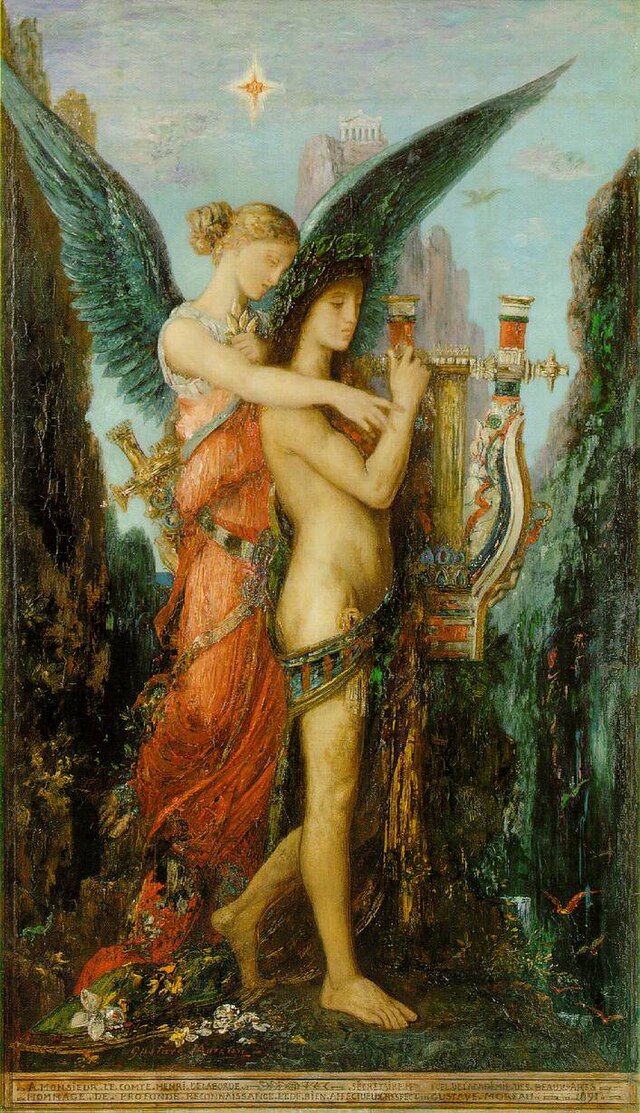Loading AI tools
Chaos (/ˈkeɪ.ɒs/;[1] Greek: χάος [] Error: {{Lang}}: invalid parameter: |3= (help)) in Greek mythology and cosmology referred to a gap or abyss at the beginning of the world, or more generally the initial, formless state of the universe[2] (the antithetical, or possibly complementary, concept was cosmos).
Later uses of the term by philosophers varied over time. In modern English, the word is used in classical studies with the original meaning; in mathematics and science to refer to a very specific kind of unpredictability; and informally to mean a state of confusion.[3] In philosophy, and in popular culture, the word can occur with all three meanings.
Cosmogonies and early philosophy

In Greek mythical cosmogony, particularly in the Theogony (Origin of the Gods) of Hesiod (8th–7th century BC), Chaos is the original dark void from which everything else appeared. First came Gaia (Earth) and Eros (Love), then Erebus and his sister Nyx (Night). These siblings produced children together which included Aether, Hemera (Day), and Nemesis.[4] Other cosmogonies, such as the lost Heptamychos of Pherecydes of Syros, also have the gods being born from Chaos, but in a different way.
Hesiod's cosmogony may have influenced the 6th century BC philosopher Anaximander,[5] although this is debated.[6] Anaximander taught that the indefinite or apeiron was the source of all things.[7] Some ideas similar to those of Hesiod also appear in the Hiranyagarbha of Vedic cosmogony, and in the Babylonian Enûma Eliš.[8] The book of Genesis in the Bible refers to the earliest conditions of the Earth as "without form, and void",[9] while Ovid's Metamorphoses describes the initial state of the Universe as a disorganised mixture of the four elements:
Rather a rude and indigested mass:
A lifeless lump, unfashion'd, and unfram'd,
Of jarring seeds; and justly Chaos nam'd.
No sun was lighted up, the world to view;
No moon did yet her blunted horns renew:
Nor yet was Earth suspended in the sky,
Nor pois'd, did on her own foundations lye:
Nor seas about the shores their arms had thrown;
But earth, and air, and water, were in one.
Thus air was void of light, and earth unstable,And water's dark abyss unnavigable.[10]
Plato, Aristotle, and later philosophy
Plato expresses a similar idea to Ovid in his Timaeus, where he says:
As I said at first, when all things were in disorder God created in each thing in relation to itself, and in all things in relation to each other, all the measures and harmonies which they could possibly receive. For in those days nothing had any proportion except by accident; nor did any of the things which now have names deserve to be named at all — as, for example, fire, water, and the rest of the elements. All these the creator first set in order, and out of them he constructed the universe.[11]
Plato acknowledges a debt to Hesiod in this dialogue, but Hesiod's concept of Chaos has been altered somewhat here,[12] and begins to approach the informal sense of chaos as disorder, both within the constituents of matter, as well in their random distribution.[13]
For Aristotle, chaos simply referred to empty space.[14] Thomas Aquinas, in his Summa Theologica, takes chaos to mean "confusion,"[15] and discusses whether primordial chaos is compatible with Christian theology.

Mathematically, chaos refers to a very specific kind of unpredictability: deterministic behaviour that is very sensitive to its initial conditions.[16] In other words, infinitesimal variations in initial conditions for a chaotic dynamic system lead to large variations in behaviour.
Chaotic systems consequently appear disordered and random. However, they are actually deterministic systems governed by physical or mathematical laws, and so are completely predictable given perfect knowledge of the initial conditions. In other words, a chaotic system will always exhibit the same behaviour when seeded with the same initial conditions - there is no inherent randomness in this regard.[17] However, such perfect knowledge is never attainable in real life; slight errors are intrinsic to any physical measurement. In a chaotic system, these slight errors will give rise to results which differ wildly from the correct result. A commonly used example is weather forecasting, which is only possible up to about a week ahead,[18] despite theoretically being perfectly possible at any level (ignoring the effects of the uncertainty principle).
Edward Lorenz and Henri Poincaré were early pioneers of chaos theory, and James Gleick's 1987 book Chaos: Making a New Science helped to popularize the field.
A number of philosophers have used the existence of chaos in this sense in the "chaos argument" about free will.
More recently, computer scientist Christopher Langton in 1990 coined the phrase "edge of chaos" to refer to the behaviour of certain classes of cellular automata.[19] The phrase has since come to refer to a metaphor that some physical, biological, economic, and social systems operate in a region where complexity is maximal, balanced between order, on the one hand, and randomness or chaos, on the other.
Wikiwand in your browser!
Seamless Wikipedia browsing. On steroids.
Every time you click a link to Wikipedia, Wiktionary or Wikiquote in your browser's search results, it will show the modern Wikiwand interface.
Wikiwand extension is a five stars, simple, with minimum permission required to keep your browsing private, safe and transparent.